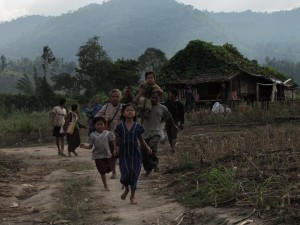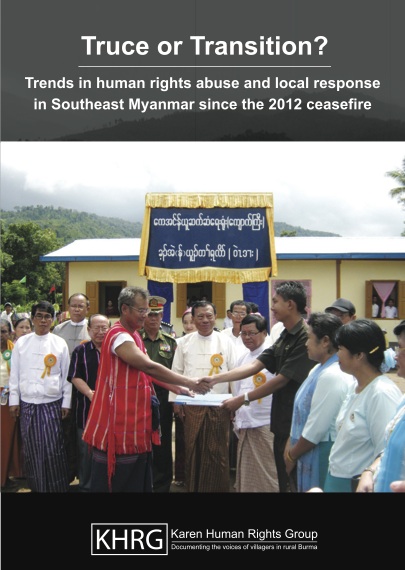Posts Tagged ‘Democratic Karen Buddhist Army’ (16 found)
AAPP’s Statement Regarding the Death of Freelance Journalist Aung Kyaw Naing, aka Par Gyi
The death of well known freelance journalist Aung Kyaw Naing, aka Par Gyi, while in military custody in Kyaikmayaw Township, Mon State, comes as a shocking reminder of how extrajudicial killings, arbitrary detention and torture are still being used against citizens in Burma […]
• • •Truce or Transition? Trends in Human Rights Abuse and Local Response in Southeast Myanmar Since the 2012 Ceasefire
In January 2012, the Myanmar government and the Karen National Union (KNU) signed a preliminary ceasefire agreement, bringing to a halt what is often referred to as the world’s longest-running civil war. This conflict engendered severe human rights abuse of civilians at the hands of a range of armed actors, primarily at those of the Myanmar Armed Forces (Tatmadaw). The ceasefire and other recent political developments in Myanmar have altered the ways in which human rights abuse is experienced by Karen people in the Southeast, and transformed the context within which these abuses can be addressed. This report aims to demonstrate how trends in human rights abuse have changed during the post-ceasefire period […]
• • •Civilian and Military Order Documents: March 2008 to July 2011
This report includes translated copies of 207 order documents issued by military and civilian officials of Burma’s central government, as well as non-state armed groups now formally subordinate to the state army as ‘Border Guard’ battalions, to village heads in eastern Burma between March 2008 and July 2011 […]
• • •UK Minister – Government of Burma should ‘reinstate ceasefire agreements’
Jeremy Browne MP, Minister of State at the Foreign Office with responsibility for Burma, has written to Burma Campaign UK stating that the government of Burma should ‘reinstate ceasefire agreements with a view to a lasting political settlement.’ […]
• • •Ethnic Armed Groups Form New Alliance
Twelve ethnic armed groups in Burma have agreed to operate together as the Union Nationalities Federal Council (Union of Burma) during four days of meetings on the Thai-Burma border. The military regime has repeatedly ignored the grievances and aspirations of ethnic communities for political, social, and economic equality and […]
• • •ASEAN, UN, asked to support refugees fleeing armed conflict in Burma: This shows the bankruptcy of junta’s 2010 polls, activists say
“There is no doubt in our mind that this decades-old armed conflict in Burma can only be resolved by forcing the junta to democratize. The Burmese junta historically is even fuelling the conflict between armed groups. This continued armed conflict simply exposes the bankruptcy of junta’s 2010 elections.”
Thus said Egoy Bans, spokesperson of the Free Burma Coalition-Philippines in reaction to the armed conflict that sparked recently near the Thai-Burma borders as a result of an increasing tension between the Burma’s military regime, The State Peace and Development Council and ethnic armed groups […]
• • •Civilians in Danger as Election-Related Armed Conflict Continues in Eastern Burma
Since Burma’s fraudulent elections on 7 November, Thailand has seen the largest influx of civilians from Burma fleeing into the country in more than a decade. On 8 November alone, 25,000 civilians fled from fighting in the town of Myawaddy and another 10,000 crossed from Three Pagoda Pass. In the weeks following the initial outbreak of violence, the armed conflict, along with flows of fleeing civilians, has continued. The volatile situation illustrates the damage done by the SPDC’s authoritarian process to entrench military rule through their “Roadmap to Democracy” and their failure to facilitate genuine national reconciliation. Just as democratization in Burma requires global support, a collective, international effort is needed to ensure the protection of civilians under threat in Eastern Burma […]
• • •Burma: Eyewitness Accounts of Abuses in Eastern Fighting
Thai Authorities Should Ensure Protection of Refugees Fleeing Conflict
The Burmese armed forces and ethnic insurgents should act to protect civilians as fighting in eastern Burma intensifies, Human Rights Watch said today. The Burmese army, or Tatmadaw, has conducted a major build up in the East following an attack and brief seizure of the border town of Myawaddy by ethnic Karen rebels on the date of the elections, November 7, 2010 […]
• • •Karen Villagers Still Fleeing Post-Election Attacks By Burmese Army
 On the same day UN Burma envoy Vijay Nambiar visited Rangoon, the Burmese Army fired mortar bombs at a civilian village in Karen State, breaking international law.
On the same day UN Burma envoy Vijay Nambiar visited Rangoon, the Burmese Army fired mortar bombs at a civilian village in Karen State, breaking international law.
Thousands of ethnic Karen have fled a new Burmese Army military offensive in Karen State, along the Thailand Burma border, in the past two weeks […]
• • •Thailand and Burma’s Civil Society Organizations Express Concern to the Royal Thai Government about the Safety of Burmese Civilians Seeking Shelter from the Escalation of Conflict in the Border Area
Armed conflict has broken out in several places along the Thai‐Burma border as a result of escalating tensions between the Burma’s military regime, the State Peace and Development Council (SPDC), and armed ethnic groups that refuse to surrender their arms or join the SPDC’s Border Guard Force[…]
• • •









 All posts
All posts